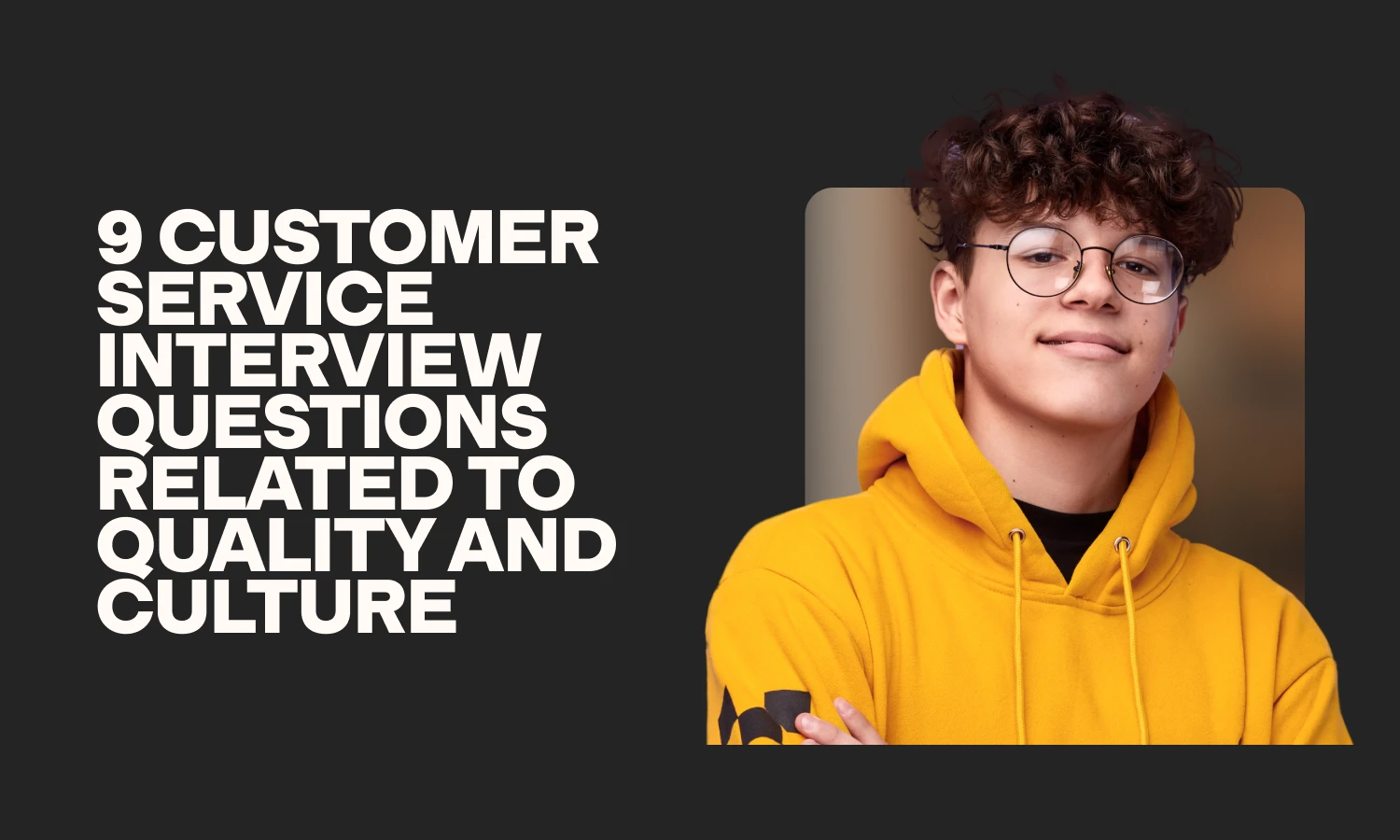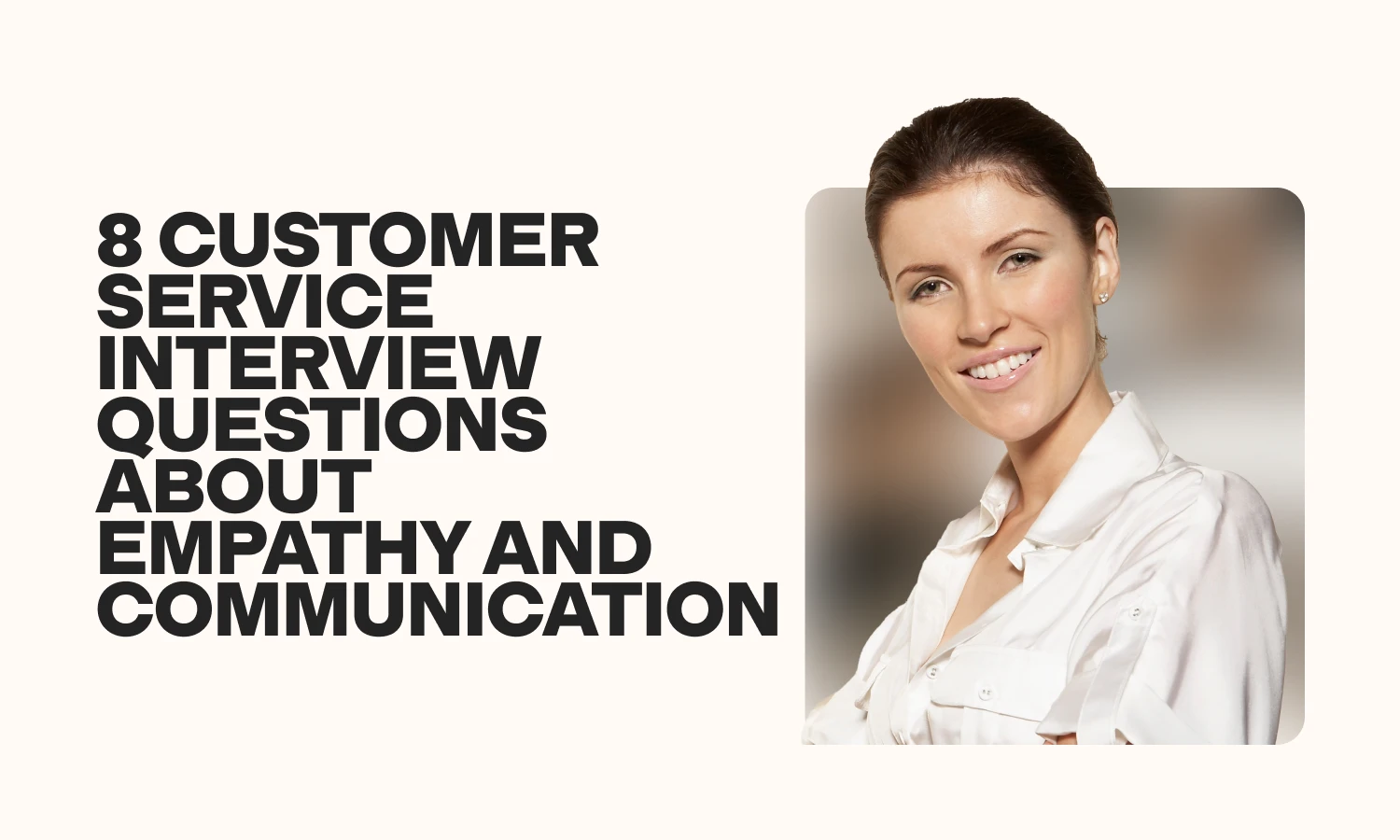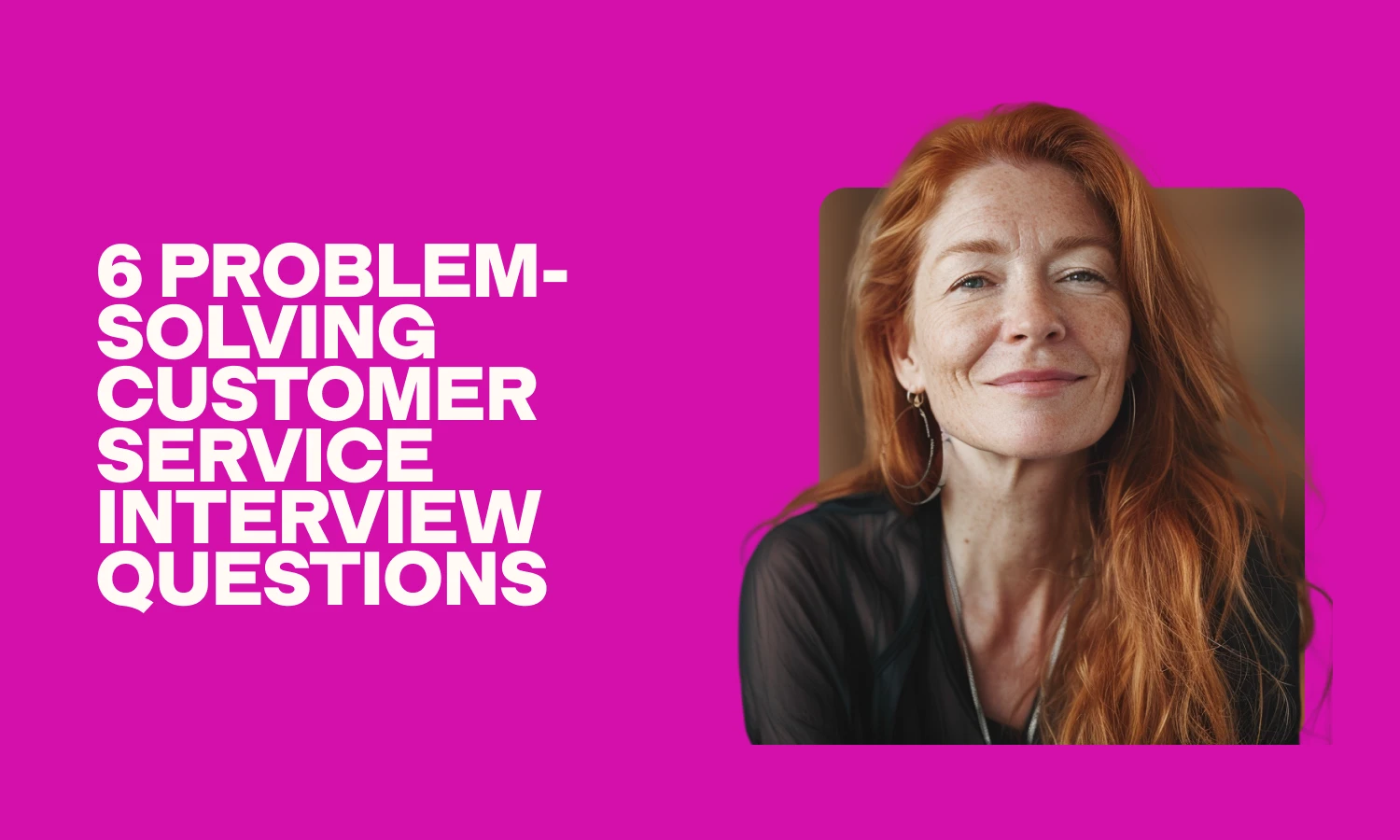23 customer service interview questions to hire the right talent
Use our online customer service skills tests to find top candidates
If you’re hiring for a customer service (CS) position, you already know how essential it is to find candidates who have the right set of customer service skills.
To determine whether your customer service applicants have the crucial customer service skills your organization is looking for, you must create a solid hiring strategy. And the right interview questions are an important element of it.
Are you unsure which questions to ask your candidates?
We’ve got you covered. In this article, you’ll find 23 customer service interview questions split into three sections:
Questions related to quality and culture, to assess your candidates’ understanding of what high-quality customer service is and how their values align with your organizational culture
Questions related to empathy and communication, to assess how well candidates can empathize and communicate with customers
Questions related to problem solving, to assess how capable applicants are of solving problems and enhancing the customer experience
Table of contents
- 9 customer service interview questions related to quality and culture
- 8 customer service interview questions about empathy and communication
- 6 problem-solving customer service interview questions
- Which is the best interview style for evaluating candidates for customer service roles?
- 3 ways to enhance the interview experience for customer service roles
- Evaluate your candidates’ customer service skills by asking the right questions
9 customer service interview questions related to quality and culture
Finding out what good and bad quality customer service means to your candidates is crucial. For this, asking the right customer service interview questions related to quality and values can help you find out whether your candidates’ customer service standards align with your company culture.
Here are nine questions to help you evaluate this, along with our comments and sample answers.
1. Where do you see yourself in three years?
How committed are your candidates to customer service? How enthusiastic are they about joining your team?
By asking this question, you can gauge how committed your candidates are to progress within your organization and drive results, perhaps in a more senior role in the future.
Sample answer
Within three to five years, I hope to have moved on to a customer service leadership position or managerial role within your organization. Since customer service is a critical element for the success of each business, I would relish the chance to prove myself in a more senior role.
2. Why is customer service important? What does it require?
Asking this question is vital, as it helps you establish whether your candidates’ perceptions of customer service align with your organization’s values, culture, and mission. It will also give you an indication of the values and customer service goals that your candidates consider a priority.
Sample answer
From my perspective, since customers have a direct influence on the growth of a company, it’s vital to serve them well and commit to providing exceptional customer service.
What’s also crucial for an organization is customer retention, which a business can achieve by helping customers make full use of the products or services they purchased. Going the extra mile helps both acquire new customers and retain existing ones.
3. Has there ever been a time in which you’ve experienced bad customer service? What would you have done to improve it?
Responses to this question will give you an insight into your candidates’ professional opinions of how not to attend to customers. Your candidates should have a broad selection of answers that demonstrate their professionalism and how they would handle the situation differently.
Again, this anecdotal interview question gives you a sense of your candidates’ culture add potential and how they might deliver better outcomes for your clients, compared to other candidates.
Sample answer
At one occasion, a customer service agent failed to apologize after keeping me on hold for 45 minutes and transferred my call to different departments, twice.
If I was in their position, I’d have shown empathy straight away, apologized for the delay, and would have tried to resolve the issue personally instead of transferring the call.
4. Can you describe an example of a situation where you provided exceptional customer service?
This question is crucial for learning more about your candidates’ professional experience.
Candidates should have plenty of examples of situations where they provided exceptional service to customers. Answers that align with your organization’s policies are the ones to note down.
Sample answer
On one occasion, a customer wanted to return a product because it was faulty. I handled the situation by apologizing and offering them the option of a full refund or a replacement product as per our store’s policy. I showed empathy from the very beginning and the customer accepted the full refund. They were satisfied with the outcome and a few days later returned to make another purchase.
5. How does our organization offer top customer service?
This question is important as it helps you find out whether your candidates have researched your organization’s values and have some knowledge of the positive outcomes it has achieved through providing excellent customer service.
Sample answer
I noticed in your job description that your organization has a briefing session every week for customer sales reps, to help your staff refresh their knowledge of your products.
Since product knowledge is crucial for customer-facing roles, I would imagine that your customer sales reps not only offer top customer service but also can recommend complementary products and services to their customers.
Don’t leave hiring customer service staff to chance
Create a comprehensive online skills assessment today
Don’t leave hiring customer service staff to chance
Create a comprehensive online skills assessment today
6. Which skills are required for a customer service role?
It’s crucial to assess the skills required for the customer service position you’re looking to fill, and asking this question helps you see whether your candidates have a solid understanding of the vital skills needed to excel in a CS role.
Sample answer
Five of the essential skills required to be successful in a customer service role are problem-solving, communication, empathy, decision-making, and the ability to adapt to new situations. For me, it’s important to know how to apply these skills in different circumstances.
For example, using empathy is vital for defusing a tense situation or when a customer is dissatisfied with a service, and decision-making skills are essential for deciding which actions I need to take to resolve the issue.
7. What does empathy mean in the context of customer service?
Empathy is a soft skill that all customer service reps should have, and candidates’ responses to this question will shed light on their empathy skills. A dictionary definition isn’t necessary. Answers to this question should mention how candidates build a rapport with their customers, even in difficult situations.
Sample answer
For me, empathy doesn’t only involve apologizing when you’ve made a mistake. In the context of customer service, building relationships is key, and it involves striving to always understand customers and get to the bottom of the issue they’re facing.
8. How would you define customer delight?
Do your candidates know how to truly delight your customers?
Assessing how knowledgeable your candidates are regarding customer delight is important, and candidates who can demonstrate that they are committed to delivering stellar customer service for your organization are the ones to watch.
Sample answer
Customer delight enables you to enhance customer loyalty and retention, but it actually goes beyond these points: loyal customers can become your brand ambassadors if you offer them a truly rewarding experience.
This is why customer delight is more than customer satisfaction, and one of the best ways to achieve it is to create a memorable, unique experience. This can be done in many different ways, such as, perhaps, by sending a thoughtful, personalized email or a gift.
9. What are some essential phases of the customer journey?
Since candidates aware of the customer lifecycle can make better decisions and make use of critical situational judgment skills to assist your organization’s clients, you should find out how familiar your candidates are with the customer journey.
Sample answer
During the customer journey, the customer transitions through four phases—initially, they are a prospect, they then become a customer, following which they become a loyal customer, and finally, a brand advocate.
8 customer service interview questions about empathy and communication
Empathy and communication are specific sub-skills that candidates for customer service roles need to have in order to excel.
Ask the following eight questions to learn whether your candidates have these critical customer service sub-skills and whether they have used them in similar contexts as what the role requires.
1. Can you describe a situation in which you had to serve a difficult customer? Which approaches did you use to deal with the situation?
Asking this behavioral interview question is vital, as it will help you learn about your candidates’ approach to diffusing a challenging situation. Take note of candidates who recognize the importance of empathy and demonstrate strong conflict-resolution skills.
Sample answer
A customer was significantly dissatisfied with the drink they were served at a bar. They had asked for a non-alcoholic beer and were served a beer that contained alcohol. I realized the mistake when I approached him to check whether he was happy with the service.
The customer explained that he didn’t drink alcohol and that he was served an alcoholic drink. I sincerely apologized for the mix-up, offered a replacement drink, and empathized with him, showing him I fully understood his frustration.
I spoke with my manager and we decided to offer the customer a second non-alcoholic drink for free. The customer left the bar satisfied.
2. Can you describe a time when you delivered excellent customer service? What was the impact of your interaction with the customer?
It’s important to know whether your candidates’ customer service standards align with your organization’s requirements, which is something you can uncover with this question. Candidates who can provide customer service at the same level as your current team are worth taking to the next round.
Sample answer
I had the responsibility of checking whether other retailers in different zip codes had specific products in stock that customers were looking for and that we didn’t have at the moment. On one occasion, a customer was very disappointed that the perfect sweater wasn’t in stock. I showed empathy and asked if she wouldn’t mind waiting for a few minutes while I checked other stores.
I called six other stores and tracked one down that had the sweater! She was delighted and later gave us a 5-star review on Google Maps.
3. Has there ever been a situation in which you or a past organization received a negative review or feedback from a customer? How did you respond?
Since reviews can be positive and negative, it’s critical to learn whether your candidates can handle both.
This question is important because it helps you know how your candidates will respond to feedback and act on it to enhance their performance.
Sample answer
I strive to continually improve my customer service skills and I take negative feedback very seriously.
In my previous role, I was responsible for searching a database to find appointments for dental patients. On one occasion, no appointments were available for the next few weeks, so it took some time to fit a patient into the busy schedule. They weren’t happy with that.
When I received their negative feedback, I resolved to explain to them the alternative options they might pursue to receive dental treatment sooner than that and assured them that the moment we have a cancellation, I would contact them immediately to offer them that appointment.
4. Have you ever found it challenging to interact with a customer because you didn’t understand their request?
Communication is essential in customer service, and this question can help you better evaluate your candidates’ communication skills. This question is also important to help you assess your candidates’ active listening skills and see how candidates act to rectify their mistakes.
Sample answer
Although I always try to solve customers’ queries myself, on one occasion, I had to seek advice from a colleague.
A dental patient of ours did not speak English, and we were not permitted to offer them treatment since they would be unaware of the treatment they would be getting. I double-checked this with my colleague, who confirmed this.
I then had to call the patient’s emergency contact, who spoke English. I showed empathy when talking with the contact, explaining that she would have to be present at the surgery so that we could proceed with treatment. I offered her a few convenient time slots, and weeks later, the treatment was complete. The emergency contact even gave us a positive review!
5. Have you ever refused to offer a service to a client due to a company policy?
Asking this question can help you shed light on how candidates empathize with customers while taking into consideration the organization’s policies.
Sample answer
An important client wanted to use a promotion code that had expired half a year ago. Unfortunately, I had to decline the request. However, I approached the situation with empathy and explained that I fully understood the client’s frustration.
I then gave them information on our upcoming promotions they could use on their next purchases.
6. How would you handle a situation in which a client who hasn’t gotten the support or service they needed from several other businesses comes to you for a solution?
In some circumstances, it might not be easy to satisfy a client. This question is a handy way to learn how candidates handle challenging clients. Your candidates must never ignore a client or dismiss the issue without listening first.
They should also show how they would prioritize the customer experience when handling the situation.
Sample answer
My first step would be to listen to the complaint actively. I would then empathize with the client and express how frustrating the situation must be for them. If I could offer a viable solution within the parameters of our organization or store policy, I would propose it to them.
If there were no viable solutions I could offer and the customer was still unhappy, I would diffuse the situation, explain why, and discuss with them the alternative options.
7. Have you ever had to de-escalate a situation involving a difficult client? Which techniques did you use?
Candidates might sometimes have to de-escalate a situation. Ask this question to find out how they would handle a difficult client.
Empathy and communication combined are often crucial to settling heated situations; empathy, in particular, is the best way to show your customers that you really care.
Sample answer
To de-escalate a heated situation, I use active listening skills throughout my interaction with the customer. I recognize the importance of dealing with situations fairly and confidently, so I begin by getting to the problem’s cause and then breaking it down into smaller issues.
If the complaint is made over the phone, I avoid putting customers on hold, as I know this can only escalate the tension further.
I’m always sympathetic to clients that might not receive a solution to the problem and apologize if it’s not possible to provide them with the exact solution they were looking for. To resolve the problem, I then offer other options that they might choose from.
8. Can you describe a situation where you had to communicate with others on your team to resolve an issue or a complaint?
Customer support roles nearly always involve teamwork. Ask this question to test your candidates’ teamwork skills and how well they communicate with other team members.
They might need to use different communication channels (phone, email, instant messaging), but in all cases, they’d need strong active listening skills.
Sample answer
In one situation, I had to communicate with a team member in the retail warehouse because a customer was mistakenly told that a product was out of stock. Since I had seen earlier that there were still some products available, I had to communicate quickly and clearly to satisfy the customer and help her purchase the product she was looking for.
In the end, although she had waited 15 minutes, she purchased the product and left the store satisfied as I offered her a coupon code to use on her next purchase.
The best insights on HR and recruitment, delivered to your inbox.
Biweekly updates. No spam. Unsubscribe any time.
6 problem-solving customer service interview questions
Solving problems is a key component to delivering exceptional customer service, especially when dealing with difficult customers.
Do your candidates have the right problem-solving skills that match your specific organization’s needs? Find out by asking them the following seven problem-solving customer service interview questions.
1. Have you ever been in a situation where you were unsure how to assist a customer? What steps did you take to find the right solution to their problem?
Sometimes, employees will not be able to solve all customer service issues on their own, and in some situations, they might need to think of unique solutions.
Regardless of whether the issue got solved on the spot, you should ask this question to know which steps were taken to maintain an exceptional customer experience.
Sample answer
An unexpected flight delay meant that our staff was unable to inform the passengers exactly when the flight would arrive.
I was unsure how to resolve the problem but started by empathizing with dissatisfied passengers. I sincerely apologized and explained that the moment we had news, we would inform them about the flight’s progress.
After communicating with the manager, we then offered the passengers complimentary sandwiches and water. We continued to provide regular updates on the details of the flight as we received them.
2. Can you tell me about a time that your product or service has caused an issue for a client? How did you handle the situation, and what was the outcome?
Asking this question can help you determine whether your candidates can respond appropriately to a customer’s problem and how well they know the organization’s product or service.
Sample answer
Several customers had returned to our store to describe a similar problem: they couldn’t hear the music they were playing through our noise-canceling headphones. I was aware that the issue was a technical problem that had affected a whole batch of our products, and our team had held a meeting about the issue.
I handled one customer’s complaint by first empathizing with them. The customer was unsure whether the fault was his, so I mentioned that since the issue was technical, he could swap his headphones for a new set or choose to have the money refunded. He chose to swap the headphones and left the store satisfied.
3. Have you ever made an error when trying to solve a problem for a customer? What would you do differently to handle the error now?
Mistakes can happen, so your goal when asking this question is to determine if your candidates can take responsibility for their errors. Follow up this question by asking your candidate how they resolved the situation.
Sample answer
When a customer requested a personal cake delivery service from our bakery and we accidentally mixed up their order with the order of another customer, we received two phone calls, one from each customer, explaining that they received the wrong order.
I had to communicate with each customer, actively listen to them, and show empathy. Once I realized the mix-up and apologized to them, I addressed the issue by re-delivering the orders along with some free iced cupcakes. Both were happy with the outcome: one gave us a positive review on our Facebook page, and the other one came to the bakery in a few days to buy another cake.
4. Are there any steps that you would take to improve customer service at our organization?
Has your candidate done their homework, and do they know what could be done to improve your organization’s customer service?
To find out more about this, ask this question to see how they’d resolve potential issues with your current level of customer care.
Sample answer
Based on my knowledge of your organization, I would propose different methods to personalize the customer experience and offer a product recommendation option for your e-commerce store based on your customers’ preferences.
Take the guesswork out of hiring customer service staff
We have over 350 online tests for job-related and soft skills
5. What would you do if a satisfied customer recommended your product or service to another customer, who, after using it, was disappointed?
This question is important for learning whether your candidates can handle two different types of feedback. Obviously, candidates should not dismiss negative feedback, but do they know how to react to it, and what to do with it?
Sample answer
I would begin by empathizing with the customer and apologize that they had had a poor experience with the product. Throughout the customer interaction, I would try to determine the root cause of their problem with our product by asking clarifying questions.
I would then actively listen to the feedback they provide and assure them that I would pass their comments on to senior management. I would then work with them to improve their experience based on their feedback and specific needs.
I would offer the customer the option of returning or replacing the product if they were still dissatisfied.
6. Have you ever experienced a customer service issue that required a creative solution?
Can your candidates think of innovative solutions to resolve multifaceted customer service challenges? Asking this question will help you determine if they’re capable of coming up with creative solutions to challenging situations.
Sample answer
In a previous role, I had a client who was visibly angry and wanted to return an item and get a full refund. But they had lost the receipt. As I was in charge of returns, I handled the situation by acknowledging their frustrations and emphasizing that I understood how they must be feeling.
I used active listening skills to fully understand why the customer wanted to return the item and explained that the store policy does not allow for refunds without the receipt. I offered the customer an alternative option, a store credit that was the equivalent value of the refund. The customer left the store in a much better mood.
Which is the best interview style for evaluating candidates for customer service roles?
A structured interview that features both behavioral and situational interview questions is ideal for interviewing candidates for customer service roles.
In structured interviews (used by many large companies, including Google), you need to ask questions in the same order and take detailed notes during or after each interview, to avoid recency bias.
Structured interviews help you:
Save time when assessing candidates
Conduct a fair and standardized interview
Minimize hiring bias
Rate your candidates’ performance more accurately
Since a customer service role is all about how a candidate’s actions create positive customer experiences, use situational and behavioral interview questions to learn how they would achieve this and whether their experiences align with your organization’s culture.
3 ways to enhance the interview experience for customer service roles
The candidate experience is crucial for building a positive employer brand and for attracting the best talent. Here are three ways you can enhance the interview experience for candidates for CS roles:
Describe your brand and your organization’s products. To get your candidates excited about your brand and products, give them some key facts about the products and what they are helping your customers achieve.
Invert the interview process. The interview stage is important for both sides to get to know each other. Moreover, the best candidates will have insightful questions for you, so give them the opportunity to learn more about the role by inverting the interview and letting them ask questions.
Use skills tests before the interview. With skills tests, you’re showing your candidates that your organization values their abilities and experience, and strives to maintain a fair and objective hiring process. With skills tests, you can easily find out who your best candidates are and invite them to an interview.
Evaluate your candidates’ customer service skills by asking the right questions
There’s no doubt that hiring the right candidates for your open customer service roles is critical for the success of the CS department, and of your organization as a whole. Coming up with the right interview questions can be a challenge, which is why we’ve compiled the ones above to help you get started.
Remember to use structured interviews and use skills tests before the interview to thoroughly evaluate your candidates and shortlist the best ones quickly and efficiently.
Hire the best customer service reps with the right skill set by asking the right questions, and watch your customer satisfaction metrics improve! Try TestGorilla for free.
You've scrolled this far
Why not try TestGorilla for free, and see what happens when you put skills first.
























